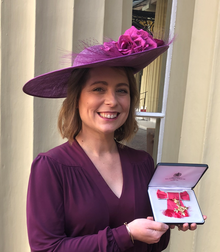Hannah Louise Cloke OBE is a British hydrologist who is Professor of Hydrology at the University of Reading.[1][2] She was awarded the European Geosciences Union Plinius Medal in 2018 and appointed Officer of the Order of the British Empire in the 2019 Birthday Honours.
Hannah Cloke | |
|---|---|
 Cloke at Buckingham Palace | |
| Born | Hannah Louise Cloke |
| Alma mater | University of Bristol (BS, PhD) |
| Awards | Plinius Medal (2018) |
| Scientific career | |
| Fields | Land surface models Large scale hydrology Ensemble flood forecasting[1] |
| Institutions | University of Reading King's College London |
| Thesis | Modelling riparian hydrology and streamflow generation (2003) |
| Website | www |
Early life and education
editCloke's father was a geography teacher and her uncle is a professor of human geography.[3] She studied geography at the University of Bristol where she earned her bachelor's degree in 1999 and a PhD in 2003.[4] Cloke worked at the Joint Research Centre on the European Flood Awareness System.
Research and career
editCloke joined the Department of Geography at King's College London. She was part of the Europeanizing Flood Forecasting program, which looked at flood forecasting and management in the European Union.[5]
She joined the University of Reading in 2012, where she is a professor of hydrology.[6] Cloke co-directs the Water@Reading group, which concentrates on water science, policy and societal impacts.[7] She is the Director of the Natural Environment Research Council programme Flooding from Intense Rainfall.[8] She is interested in flood forecasting and risk management, leading the project TENDERLY (Towards END-to End flood forecasting and a tool for ReaL-time catchment susceptibilitY).[8] She works with the Met Office, Environmental Agency and the European Centre for Medium-Range Weather Forecasts (ECMWF).[9] Cloke's Global Flood Awareness System is a partnership between the European Commission and the ECMWF, and provides hydrological monitoring and forecasting that is independent of political boundaries.[10] She was also involved with the Natural Environment Research Council projects Susceptibility of catchments to INTense RAinfall and flooding (SINATRA) and Improving Predictions of Drought for User Decision-Making (IMPETUS).[11][12] Since climate change will make flooding more probable, Cloke says that we should start to take precautions to protect homes and livelihoods.[13]
Cloke's research helps policymakers make better decisions about flood preparation.[14][15] She has discussed the problems with the United Kingdom's flood defence systems.[16][17] She called for the National Flood Resilience Review to evaluate how flood risks are likely to change in different locations across the United Kingdom.[18] She is supported by the European Commission Horizon 2020 programme. In 2019 Cloke created IMPREXive, a game that allowed players to control flood forecasting during a deluge.[19] The information provided to the players is not always correct; and decisions must be made to keep cities safe.[19]
She has written for The Conversation and The Guardian.[20][21] She was the guest on The Life Scientific on BBC Radio 4 in October 2021.[22]
Awards and honours
editHer awards and honours include;
- 2013 Natural Environment Research Council Early Career Impact Award[14]
- 2016 Guardian Research Impact Award runner-up[23]
- 2018 European Geosciences Union Plinius Medal[24]
- 2019 Officer of the Order of the British Empire[25]
References
edit- ^ a b Hannah Cloke publications indexed by Google Scholar
- ^ Cloke, H.L.; Pappenberger, F. (2009). "Ensemble flood forecasting: A review". Journal of Hydrology. 375 (3–4): 613–626. Bibcode:2009JHyd..375..613C. doi:10.1016/j.jhydrol.2009.06.005. ISSN 0022-1694.
- ^ "Professor Hannah Cloke OBE: Forecasting floods for a better future". University of Reading. Retrieved 2023-03-13.
- ^ Cloke, Hannah Louise (2003). Modelling riparian hydrology and streamflow generation. jisc.ac.uk (PhD thesis). University of Bristol. OCLC 499141030. EThOS uk.bl.ethos.288231.
- ^ "King's College London - Europeanizing Flood Forecasting". www.kcl.ac.uk. Retrieved 2019-06-12.
- ^ The University of Reading. "Professor Hannah Cloke - University of Reading". www.reading.ac.uk. Retrieved 2019-06-12.
- ^ "Water@Reading". Reading. Retrieved 2019-06-12.
- ^ a b "Flooding From Intense Rainfall | Project FRANC & Project SINATRA". Retrieved 2019-06-12.
- ^ "Professor Hannah Cloke wins 2018 Plinius Medal". Reading. Retrieved 2019-06-12.
- ^ "Global Flood Awareness System – GloFAS Community Learning Framework". www.globalfloods.eu. Retrieved 2019-06-12.
- ^ "IMPETUS: Improving Predictions of Drought for User Decision-Making". UKRI. Retrieved 2019-06-12.
- ^ "Professor Hannah Cloke wins recognition for Research Impact | FCERM.net". fcerm.net. Retrieved 2019-06-12.
- ^ Mileham, Rebecca (2014-08-11). "Dam floods and ponds". eandt.theiet.org. Retrieved 2019-06-12.
- ^ a b "NERC - NERC 2015 Impact Awards". nerc.ukri.org. Retrieved 2019-06-12.
- ^ UniofReading (2016-12-06), Professor Hannah Cloke: forecasting floods for a better future, retrieved 2019-06-12
- ^ "'Dredging would not have saved Levels'". bbc.com. BBC News. Retrieved 2019-06-12.
- ^ Kirk, Ashley (2017-11-23). "What is Britain doing to tackle flooding in the face of extreme weather?". The Telegraph. ISSN 0307-1235. Retrieved 2019-06-12.
- ^ "Learning to live with floods will be key to UK policy review". newscientist.com. Retrieved 2019-06-12.
- ^ a b "IMPREXive game highlights importance of forecasting in flood management". www.preventionweb.net. Retrieved 2019-06-12.
- ^ Cloke, Hannah. "Britain is in the middle of a drought – so how come there's flooding?". The Conversation. Retrieved 2019-06-12.
- ^ "Hannah Cloke | The Guardian". the Guardian. Retrieved 2019-06-12.
- ^ "BBC Radio 4 - The Life Scientific, Hannah Cloke and predicting floods". BBC. Retrieved 7 October 2021.
- ^ Guardian Staff (2016-03-17). "Research impact category: award winner and runners up". The Guardian. ISSN 0261-3077. Retrieved 2019-06-12.
- ^ "Hannah L. Cloke". European Geosciences Union (EGU). Retrieved 2019-06-12.
- ^ Hughes, David (2019-06-12). "Queen's birthday honours list 2019 in full: here's everyone recognised this year". inews.co.uk. Retrieved 2019-06-12.